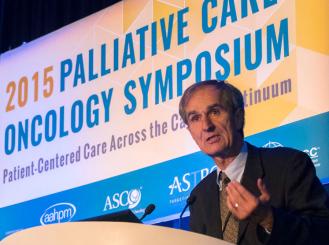Jan 26, 2016
The 2015 Palliative Care in Oncology Symposium fostered thoughtful discussion and new insights among faculty and attendees. As part of the ASCO Connection Clinical Conversations series, Symposium leadership have selected questions submitted during sessions by attendees via the electronic question-and-answer system (eQ&A) that could not be addressed in the time available onsite.
Eduardo Bruera, MD, FAAHPM, of The University of Texas MD Anderson Cancer Center, chaired General Session 2: Cachexia—Bench. Dr. Bruera and Jose M. Garcia, MD, PhD, of Baylor College of Medicine, presented in the session, and address some of the unanswered questions posed there.
Total parenteral nutrition (TPN) and other advanced nutritional supports seem recommended without evidence?
EB: Multiple randomized controlled trials of TPN compared with control for cancer cachexia were conducted in the 1980s and early 1990s and they were largely negative. However, for some patients the starvation component may be quite severe and they may not be good candidates for enteral feeding due to short bowel or bowel obstruction. In these patients, if there is a slowly growing tumor, a trial TPN might be useful.
Does chemotherapy-responsive advanced cancer mitigate the impact of sarcopenia/cachexia?
EB: Yes, it does. There is very good evidence that response to chemotherapy is associated with both weight gain and decreased associated symptoms such as fatigue and anorexia. In many cases, weight loss and anorexia/ fatigue are early markers of disease progression.
Can you comment on the use of medications like mirtazapine or olanzapine for cachexia?
EB: Mirtazapine causes weight gain and increased food intake when used for depression, and there are preliminary studies suggesting that it can improve anorexia in cancer patients. It might be useful in cachectic patients who also have depression and insomnia.
Olanzapine can also cause weight gain as a side effect and there is also preliminary evidence of antiemetic effects in cancer. Olanzapine might be useful for cachectic patients with cancers who also have nausea, anxiety, or early delirium.
More research is needed to better understand the role of these two agents and, in my view, these studies are quite justified.
In patients with cachexia (and slow gut), is it acceptable to use medications to improve motility in a patient complaining of bloating? If so, do you have preferred medications?
EB: Yes, it is justified to try pro-motility agents such as metoclopramide (especially if cachectic patients have early satiety, bloating, and pain after eating [dyspepsia]). Laxatives (senna and polyethylene glycol) should be used routinely and aggressively in all patients receiving opioids.
How can markers be combined to create a refined prognostic tool? Does modifying these markers (such as testosterone) change the prognosis?
JG: This is an excellent thought and is one that several groups working in the field are currently pursuing. To this point, several markers, including body weight, body composition, inflammation, testosterone, and others, have been shown to correlate with clinically relevant endpoints such as tolerance to therapy, quality of life, and survival.
You also raise a critical question: Does modifying these factors alter the outcomes? Unfortunately, there are no FDA-approved treatments for anorexia or cachexia related to cancer. Preliminary studies are promising for several of these targets, but larger studies are needed before clinical recommendations can be made.
Are there any data to support that testosterone administration actually improves outcome in men with low testosterone concentrations?
EB: There is strong evidence that cachectic men with cancer have a high frequency of hypogonadism. This is aggravated when these patients are receiving opioids. (Our group published several studies which you can find under my name in Pubmed). We conducted an inconclusive clinical trial of testosterone replacement and there have been no large clinical trials so far. Hypogonadism is associated with several major symptoms that are also present in patients with advanced cancer, such as fatigue, depression, decreased sexual desire, anemia, and decreased muscle mass. In patients who are found to be hypogonadic and have several of these findings, a therapeutic trial of testosterone replacement might be justified.
Read more 2015 Palliative Care in Oncology Clinical Conversations:

